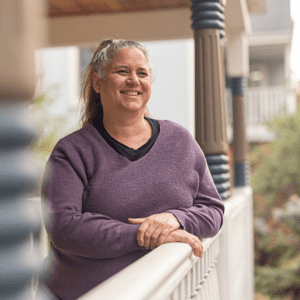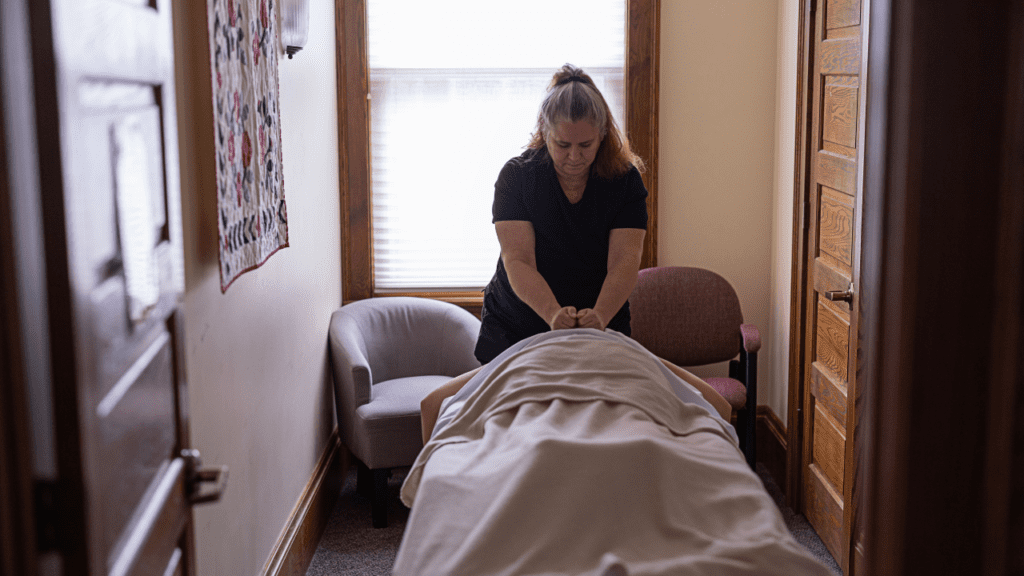Expanding Access to Massage Therapy
Many people do not have access to integrative therapies like massage. Diane Long, MHS, SEP, BCTMB (they/them) has built a career trying to change that. Diane, who graduated from the massage therapy program 15 years ago and also earned their master of health science in integrative care this year, has found creative ways of expanding access to massage therapy for groups who are largely underserved in healthcare.
Massage Therapy for Survivors
Most recently, Diane began working with the Center for Victims of Torture (CVT). There, they provide Trauma-Informed and Culturally-Responsive Integrated Massage Therapy (TCI-Massage). A decade ago, Diane worked as a French interpreter for CVT, so they were an especially good fit for this project, with a commitment to both human rights and hands-on healing.
The research project at CVT is funded by a grant from the Massage Therapy Foundation. Sara Phillips, a social worker at CVT and recent NWHSU massage therapy graduate, was instrumental in getting the project off the ground. Designed to assess how well TCI-Massage supports healing for survivors of torture and war trauma, the study measures things like pain, mental health symptoms, sleep, and heartrate variability (HRV). Informed by MABT (Mindful Awareness in Body-oriented Therapy), sessions incorporate breathing, body literacy, and self-compassion. TCI-Massage strives to be culturally responsive, relevant and accessible across various languages and cultures.
Diane has completed a massage series with 10 clients thus far, who have all reported palpable change. “People often feel overwhelmed and isolated by trauma and chronic pain, fearing that things will not get better. Therapeutic touch provides a direct, immediate experience of comfort and support and reminds people that positive change is possible,” Diane explained.
As clients gain more awareness and connection to their own bodies, their relationship to pain changes.”
Integrative Health Services for Unhoused Youth
In 2021, Diane was recruited to build an integrative health program at SafeZone, a drop-in center for unhoused youth and young adults in St. Paul. Fellow alum Jessica Hanson, LAc now works there one day a week. Nate Burdash, DC, another alum, has popped in a few times to do some “marathon adjusting.” NWHSU massage therapy interns do a clinical rotation there at least once a year, gaining valuable experience.
Since its inception, the program has offered more than 2600 sessions. These include massage, acupuncture, yoga, personal training, and more, giving youth opportunities to explore different modalities. Diane was driven by a model of equity-minded healthcare. In this model, it is essential to hire practitioners who represent the populations served and to pay them well. (64% of youth served in this program are African American and 36.7 % LGBTQIA2S+). This provides positive role models and creates more community sustainability.
“Diane really was the architect of that program,” shared Jessica. “I’m inspired by the effort Diane put into creating a vision of health programming for marginalized young people that looks so layered and supportive.”
Expanding Access to Massage Therapy, Inspired by an NWHSU Internship

Diane is now an adjunct professor and clinical supervisor at NWHSU. “Being able to contribute and make a difference keeps me going,” they shared. “It hasn’t been the most direct route to building a career, but it has been rich and meaningful.”
Informed by Self-Defense
Victim advocacy, self-defense and martial arts led Diane into the bodywork field, and those tenets continue to inform their work. “I’ve felt drawn to working with underserved populations since I was young, defending people from bullies,” Diane shared. “I have taught Empowerment Self Defense (ESD) for over 30 years, to help people prevent, interrupt, and heal from violence and oppression. Self-defense helped me develop critical skills for self-protection and manage fear and anxiety related to past trauma. Bodywork helped me release the body armor and chronic pain that came from being overly defended.” Diane underscored how health and safety go hand in hand. “Building a culture of consent and increasing health equity through an explicitly trauma-informed, racial justice lens is core to everything I do.”
